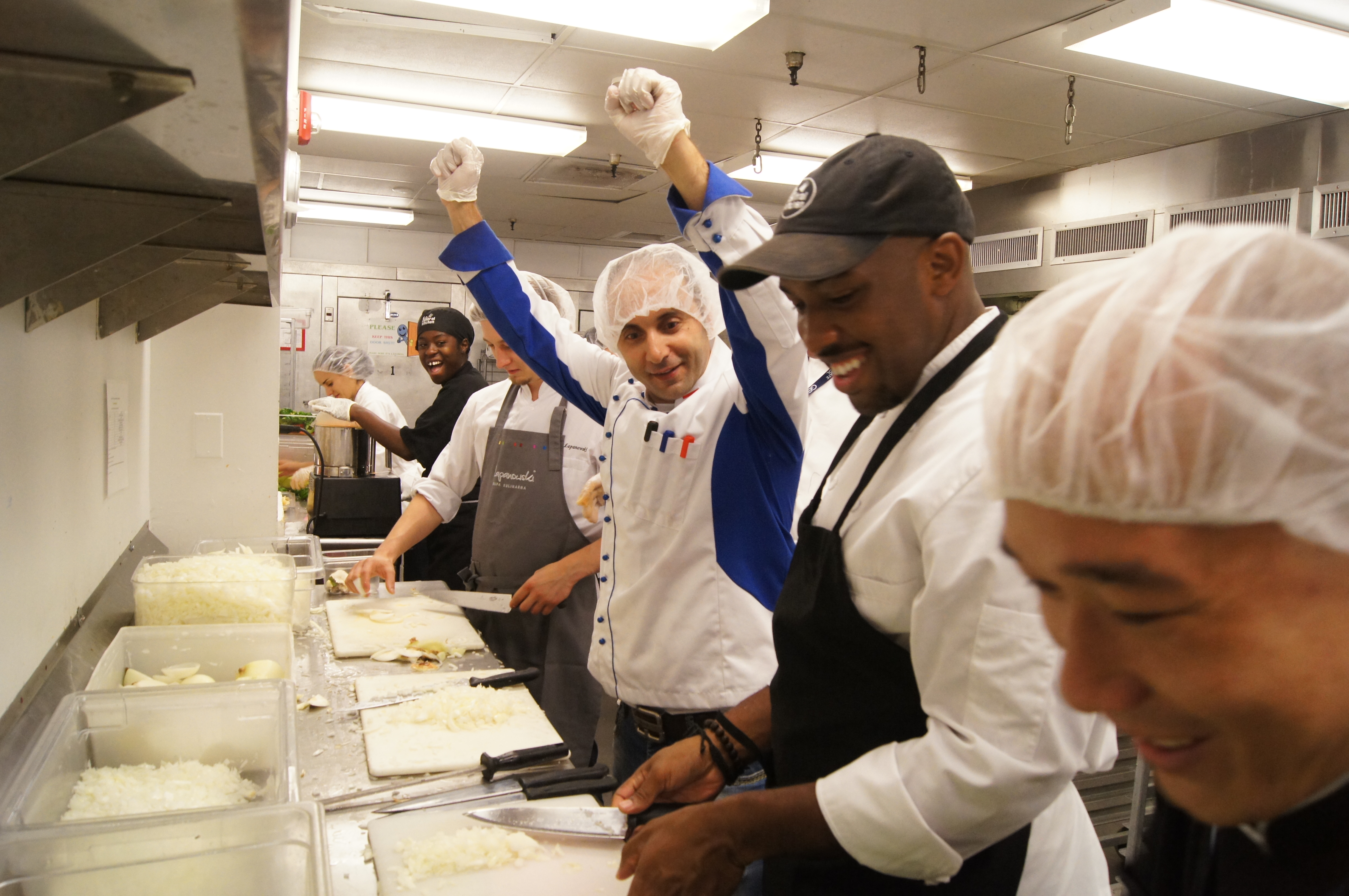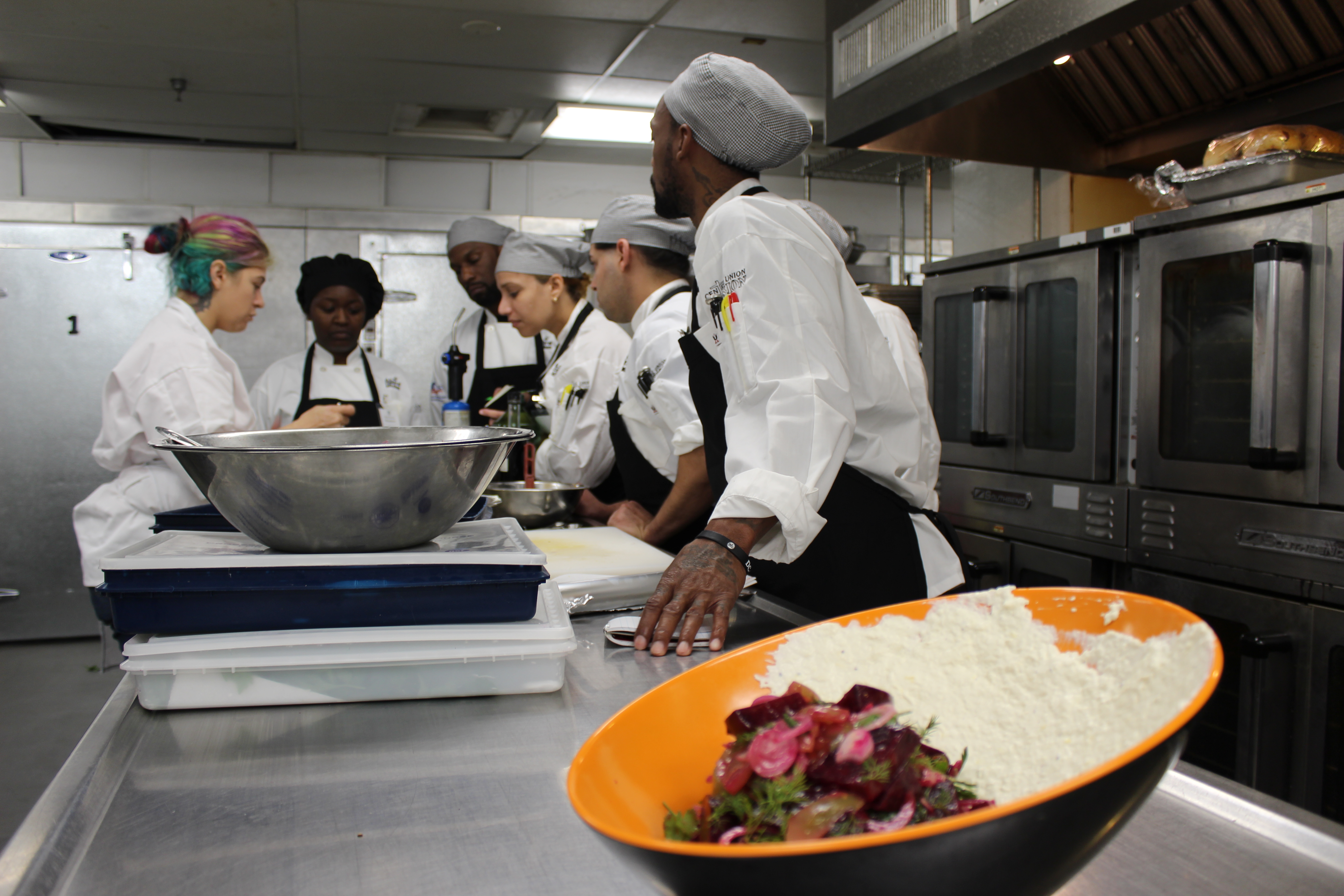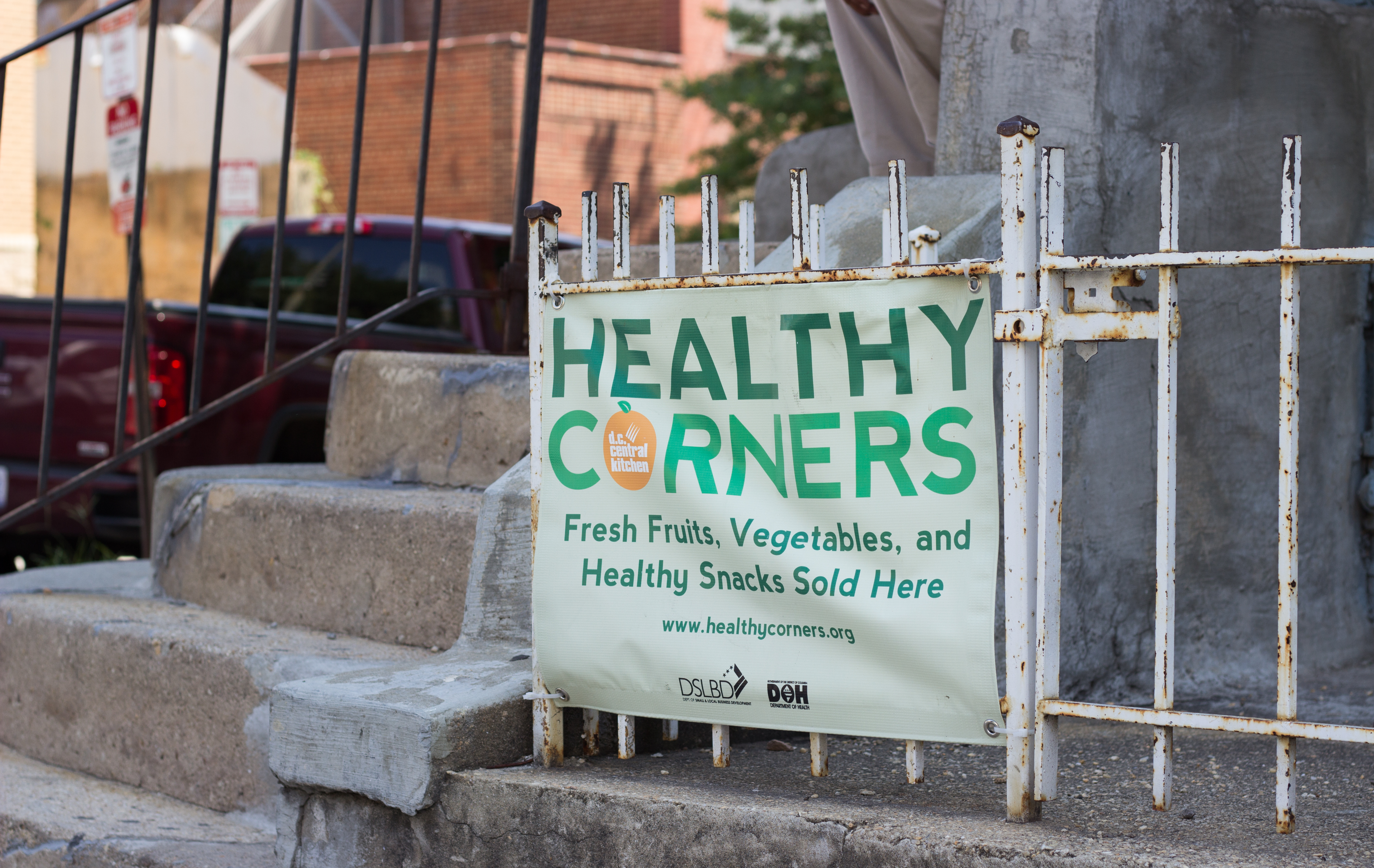Laura Belazis is director of food access and education for DC Central Kitchen (DCCK), a community kitchen in Washington, D.C., that develops and operates social ventures targeting the cycle of hunger and poverty.
Photo: DC Central Kitchen
Why was DCCK founded?
Belazis: DCCK was founded in 1989 by a young nightclub manager named Robert Egger. Frustrated and challenged by his volunteer experiences with traditional charitable responses to hunger and homelessness, Robert pioneered a new model aimed at liberating people from the conditions of poverty.
Robert’s idea for a ‘central kitchen’ involved picking up wasted food, turning it into balanced meals for shelters and nonprofits, and using that process to train jobless adults in the culinary arts. Robert became an early adopter of ‘social enterprise’ and started hiring DCCK culinary graduates to staff revenue-generating contracts in 1996.
He also instilled an ‘open source’ tradition at DCCK, helping to start more than 60 like-minded central kitchens across the United States through the 1990s. In 2001, he launched another social venture, The Campus Kitchens Project, aimed at scaling our approach nationally by engaging college students in recovering wasted food from dining halls that they could use in preparing meals for their own community.
What are the main issues DCCK is trying to address in the city today and how does it approach this work?
Belazis: Unequal access to economic opportunity and healthy food has created a public health crisis in DC’s low-income neighborhoods. With only three full-service grocery stores east of the Anacostia River in Wards 7 and 8 and nearly 200,000 DC residents living on city blocks where the closest healthy food retailer is three times farther (or more) from the closest fast food or convenience food store, improving access to healthy food in DC has never been more critical.
We know we will never end hunger with food alone. That’s why we combine food with empowerment and culinary training. By preparing adults with high barriers to employment for culinary careers and creating good, living wage jobs for our culinary graduates here at DCCK, we target the root cause of hunger by offering pathways out of poverty.
In addition, we are paying special attention to developing training and employment opportunities for DC youth. The unemployment age for District residents under age 24 is twice that of older D.C. residents, and this number doubles among youth who are African American.
What kinds of impact have you seen from DCCK’s programs?
Belazis: DCCK serves more than 1 million locally-sourced, scratch-cooked, healthy meals to low-income students at 15 D.C. schools annually, with a focus on DC Public Schools in Ward 7. In addition to providing meals, we offer engaging cooking demonstrations, taste tests, and nutrition education lessons for the students and staff at the schools we serve.
We hire graduates of our culinary program to prepare the fresh produce and healthy snacks we deliver to 60+ corner stores in DC’s food deserts. We also provide a new market for area farmers by operating DC’s only permanent food hub and using our purchasing power to bring locally-sourced, healthy food to more DC communities.
Each of our ventures creates opportunities for meaningful careers, expands access to healthy food, and tests innovative solutions to systemic failures.![]()
Photo: DC Central Kitchen
What do you think has been key to DCCK’s approach that has enabled its successes?
Belazis: We never stop trying to do what is right, even if we don’t know how to do it! As our founder once said, we practice “relentless incrementalism.” Progress may be slow but movement in the right direction is what matters. We also live our values. Currently, 83 of our 181 staff members are graduates of our own Culinary Job Training program.
What have been DCCK’s greatest challenges since its founding?
Belazis: The other side of the coin in accepting incrementalism! Progress is slow, and change is hard.
How have the city’s needs changed over the years and how has DCCK adjusted its approach based on this?
Belazis: In 2010, there were 7 full-service grocery stores in Wards 7 and 8. By 2016, although the total number of grocery stores in DC had increased, the number in Wards 7 and 8 had dropped to only 3 grocery stores for nearly 150,000 people. Our Healthy Corners venture was created to prove that there is a demand for healthy, affordable options in food deserts, and accelerate pathways to accessing healthy food. It takes time for the city to incentivize large grocery retailers to move into the neighborhood, but our Healthy Corners program is able to use existing assets in the community to operate on a faster timeline.
What have been the greatest challenges facing you personally in your work with DCCK and how have you overcome them?
Belazis: My biggest challenges are making everything we do count, and ensuring that we’re making smart, strategic decisions that will maximize our resources to create the most transformative and lasting change in the community. To meet these challenges head-on, I asked my team to take a step back and look at all of our program activities with fresh eyes and ensure that each activity is strategically aligned with the core elements of our mission: expanding access to healthy food, testing innovative solutions to systemic failures, and creating opportunities for meaningful careers. This strategic exercise confirmed that many of our activities were right on target, but also helped us pivot on others to focus more directly on serving our clients and following our mission. It’s easy for nonprofits to continue “business as usual” because that’s the way they’ve always done things, but we challenge ourselves every day to ask the hard questions.
Photo credit: DC Central Kitchen
What role does a preventive approach play in DCCK’s strategy?
Belazis: As a public health professional, DCCK’s preventative approach was what first drew me to the organization. While there’s a need for emergency programs, our focus is on breaking the cycle of poverty. When we provide meals, it’s not to individuals, but to social service organizations so that they can invest more of their program dollars into the services that benefit their clients. And while society actively makes it harder for people with a history of incarceration to start over (the American Bar Association compiled over 40,000 sanctions that limit ex-offenders’ ability to get on with their lives), we believe that everyone deserves a second chance. Our Culinary Job Training graduates with a criminal record are 90% less likely to re-offend and return to prison than the national average.
Each of our programs is designed to create an environment of dignity and respect for everyone we serve, regardless of their situation in life.
How does DCCK’s work help improve residents’ health and advance health equity?
Belazis: While DC as a whole has made great strides in recent years, many residents are getting left behind. African Americans living in DC are six times more likely to die from diabetes-related complications and African American men on average live 15 fewer years than their white counterparts. The stark health disparities that exist in DC are driven by socioeconomic factors – African American families are 3.5 times more likely to live below the poverty line, and experience substantially higher unemployment rates.
Social determinants of health are at the heart of our work. As an example, our Culinary Job Training program helps men and women find meaningful careers that translate to health insurance, stable housing, the ability to provide social support to their families, and reduced stress.
Do DC residents have any impact in determining DCCK’s approach to its programs and focus?
Belazis: With nearly 50 percent of our staff composed of graduates of our Culinary Job Training program, including in managerial roles, the community we serve is vital to our decision-making. We also regularly attend community stakeholder meetings, such as the Ward 5, 7, and 8 Health Councils to share what we are doing and make sure we include a broader perspective. In the coming year we will also be developing a network of community advocates who will directly inform our work.

Photo credit: DC Central Kitchen
How did you get into this work? What motivates you during challenging times?
Belazis: From a young age, my family instilled in me the importance of giving back to your community. From preparing meals at Miriam’s Kitchen as a child, to serving in the Peace Corps as a young adult, I became more aware of social justice, and more committed to finding work that is meaningful and fulfilling. At DCCK, I know that I’m working for more than a paycheck, and our work can really make a difference in people’s lives.
What is your advice for other individuals or organizations trying to do the work you are doing?
Belazis: Try to put yourself out of business. Too many organizations focus on chasing big funding opportunities and expanding their operations, at the expense of what really matters: actually solving the problem. If we do our work well, there won’t be a need for us anymore.
Views expressed are those of the interviewee and do not necessarily reflect the views of the National Academy of Medicine.
The Community Health Heroes Series highlights individuals or groups who are working to advance health and health equity in communities across the nation. Learn more about this series.




